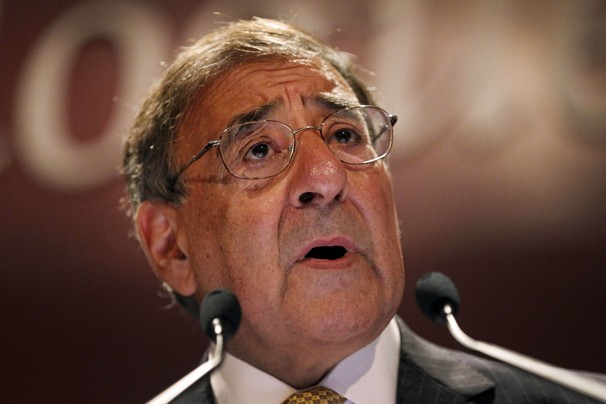
Bộ trưởng Quốc phòng Mỹ Leon Panetta phát biểu tại Shangri-La ở Singapore
Mối lo ngại của các đồng minh và đối tác của Hoa Kỳ ở châu Á là liệu Washington có đủ phương tiện tài chánh để thực hiện chiến lược mới của mình hay không, trong bối cảnh ngân sách quốc phòng Mỹ bị buộc phải cắt giảm như hiện nay. Trong bài phát biểu của mình, Bộ trưởng Quốc phòng Panetta cho là khủng hoảng ngân sách ở Washington sẽ không ảnh hưởng đến kế hoạch hướng về châu Á của quân đội Hoa Kỳ.
Theo ông, nước Mỹ đang dự trù đầu tư thêm vào các loại phương tiện cần phải có để nâng cao năng lực tung nhanh các lực lượng hùng hậu đến hiện trường, cũng như tăng cường khả năng tác chiến tại khu vực châu Á-Thái Bình Dương. Trong số các phương tiện này có « các loại chiến đầu cơ tàng hình, tránh được radar, một loại oanh tạc cơ đường trường, các vũ khí dùng trong chiến tranh điện tử và các hệ thống phòng thủ tên lửa. »
Trong bối cảnh cạnh tranh Mỹ-Trung ngày càng rõ nét, trong những cuộc trao đổi riêng tư, các quan chức Mỹ thừa nhận là việc tăng cường sự hiện diện quân sự của Mỹ tại châu Á có mục tiêu củng cố thêm cho ngành ngoại giao Mỹ khi phải đối mặt với thái độ quyết đoán của Bắc Kinh ở Biển Đông.
Tuy nhiên, trong diễn văn của mình vào hôm nay, Bộ trưởng Quốc phòng Mỹ đã nhấn mạnh là việc Hoa Kỳ đổi mới chiến lược hoàn toàn không phải là nhằm thách thức Trung Quốc. Theo ông cả hai nước đều có lợi trong việc thúc đẩy an ninh và thương mại trong khu vực.

Wong Maye-E/ Associated Press
SINGAPORE — From this island nation in the South China Sea, U.S. Defense Secretary Leon Panetta sent a message Saturday that America’s new military focus on the Asia-Pacific is not intended to raise tensions in the region or threaten Beijing.
The Pentagon chief appeared to offer an olive branch to the communist power and said often feuding rivals must learn to work better together for the benefit of the entire region.
Delivering his most extensive thoughts to date on the fragile state of U.S.-China relations, Panetta said neither side is naive about their disagreements.
“We both understand the differences we have, we both understand the conflicts we have, but we also both understand that there really is no other alternative but for both of us to engage and to improve our communications and to improve our (military) relationship,” Panetta said at a security conference in Singapore.
At the same time, however, Panetta said Asian nations must find a way to resolve their own conflicts because the U.S. cannot always come charging in to help.
Tensions between the U.S. and China reverberate across the region, and are often focused on America’s support of Taiwan, which China regards as a breakaway province and threatens to use force to block any Taiwanese bid for formal independence.
Another area of dispute is the South China Sea, which Beijing claims almost entirely as its own. But Taiwan, Vietnam, Malaysia, Singapore, Brunei and the Philippines also have territorial claims.
More recently the U.S. has been vocal in blaming China for cyberattacks that emanate from the country and steal critical data from U.S. government agencies and private American companies.
On that front, Panetta said U.S. and Chinese leaders have talked about developing teams that can work together on difficult issues. That could involve how to exchange information on computer-based threats and whether they can agree on standards for the use of cybercapabilities.
The goal, Panetta said, is for the U.S. and China to develop the ability to communicate when disputes arise so that they can be resolved peacefully.
Defense experts attending the conference questioned Panetta extensively about China, with one query coming from a member of China’s People’s Liberation Army. But officials also noted that Beijing did not send any of its senior leaders to the conference. It was not clear why, although some officials suggested that China’s leaders were busy with internal issues.
Questioners asked whether adding more U.S. military to the region might embolden some smaller nations and risk triggering more conflicts. They also wondered aloud whether China’s leaders boycotted the conference in protest over America’s new strategy for the region.
“I don’t think we should take the attitude that just because we improve their capabilities that we’re asking for more trouble,” Panetta said.
Panetta also issued a strong call for Asian nations to set up a code of conduct, including rules governing maritime rights and navigation in the South China Sea, and then develop a forum where disputes can be settled.
Wong Maye-E/ Associated Press










































